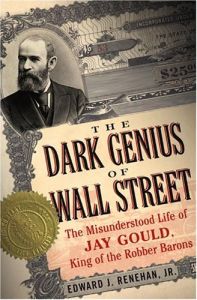Join getAbstract to access the summary!

Join getAbstract to access the summary!
Edward J. Renehan
The Dark Genius of Wall Street
The Misunderstood Life of Jay Gould, King of the Robber Barons
Basic Books, 2005
What's inside?
Was Jay Gould a rapacious and ruthless robber baron, or a driven escapee from a dreadful childhood, or both?
Recommendation
This biography of Wall Street baron Jay Gould is in some ways a primer on how American media and public opinion seem to demonize capitalists who succeed at doing what capitalists are wont to do, namely, making money. Of course, Gould was no ordinary capitalist. His ruthless tactics gave his enemies a big target to dislike. After all, when you single-handedly create an investment bubble that leads to a crash in the price of gold, resulting in congressional hearings aimed at placing blame, you expect to make a few enemies. Veteran biographer Edward J. Renehan paints a fair, nuanced and colorful portrait of Gould, whose manic focus on business success probably was driven by his tragic childhood. getAbstract strongly recommends this book, especially to students of business history, in the belief that it offers a more in-depth record about an extraordinary and extraordinarily flawed man who was vilified in his time.
Summary
About the Author
Edward J. Renehan, Jr., is the author of more than half a dozen books including The Kennedys at War, The Secret Six and John Burroughs: An American Naturalist. He contributes to various publications and has appeared on C-SPAN and PBS.

















Comment on this summary